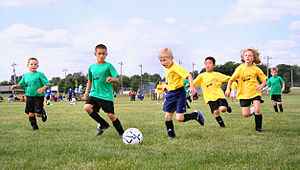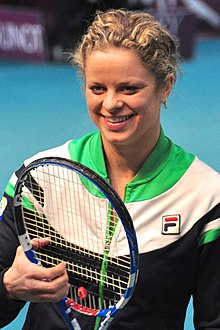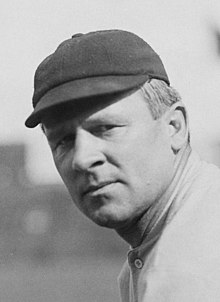The Sports Portal

Sport is a form of physical activity or game. Often competitive and organized, sports use, maintain, or improve physical ability and skills. They also provide enjoyment to participants and, in some cases, entertainment to spectators. Many sports exist, with different participant numbers, some are done by a single person with others being done by hundreds. Most sports take place either in teams or competing as individuals. Some sports allow a "tie" or "draw", in which there is no single winner; others provide tie-breaking methods to ensure one winner. A number of contests may be arranged in a tournament format, producing a champion. Many sports leagues make an annual champion by arranging games in a regular sports season, followed in some cases by playoffs.
Sport is generally recognised as system of activities based in physical athleticism or physical dexterity, with major competitions admitting only sports meeting this definition. Some organisations, such as the Council of Europe, preclude activities without any physical element from classification as sports. However, a number of competitive, but non-physical, activities claim recognition as mind sports. The International Olympic Committee who oversee the Olympic Games recognises both chess and bridge as sports. SportAccord, the international sports federation association, recognises five non-physical sports: chess, bridge, draughts, Go and xiangqi. However, they limit the number of mind games which can be admitted as sports. Sport is usually governed by a set of rules or customs, which serve to ensure fair competition. Winning can be determined by physical events such as scoring goals or crossing a line first. It can also be determined by judges who are scoring elements of the sporting performance, including objective or subjective measures such as technical performance or artistic impression. (Full article...)
Selected articles
Selected pictures
Did you know...
- ...that Ed Brown was an African-American slave who rose to become a Belmont Stakes-winning jockey and a Kentucky Derby-winning horse trainer?
- ...that Bearcat Stadium (pictured) of Northwest Missouri State University, originally opened in 1917, is the oldest stadium of any NCAA Division II school?
- ...that Australian sprinter Stanley Rowley is the only Olympic participant to win medals for two countries at the same Olympic Games?
- ...that Battlefield Baseball, a Japanese film, features elements of the sports, martial arts and horror genres, as well as including three musical numbers?
- ...that whipcracking, the art of using a whip to create a miniature sonic boom, is a competitive sport in Australia, where it was also elaborated into whipboxing?
Selected quote
Selected athlete
Hill became a test driver for the Formula One title-winning Williams team in 1992. He was promoted to the Williams race team the following year after Riccardo Patrese's departure and took the first of his 22 victories at the 1993 Hungarian Grand Prix.
During the mid 1990s, Hill was Michael Schumacher's main rival for the Formula One Drivers' Championship. The two clashed on and off the track. Their collision at the 1994 Australian Grand Prix gave Schumacher his first title by a single point. Hill became champion in 1996 with eight wins, but was dropped by Williams for the following season. He went on to drive for the less competitive Arrows and Jordan teams, and in 1998 gave Jordan its first win. He retired from racing after the 1999 season.
In 2006, Hill became president of the British Racing Drivers' Club, succeeding Jackie Stewart. Hill stepped down from the position in 2011 and was succeeded by Derek Warwick. Hill has also regularly appeared in the British media, writing articles for F1 Racing magazine and working as a pundit for Sky Sports F1. (Full article...)
Selected team
The governing body, the Welsh Rugby Union (WRU), was established in 1881, the same year that Wales played their first international against England. Wales' performances in the Home Nations Championship (now the Six Nations) continued to improve, experiencing their first 'golden age' between 1900 and 1911. They first played New Zealand, known as the All Blacks, in 1905, when they defeated them 3–0 in a famous match at Cardiff Arms Park. Welsh rugby struggled between the first and second World Wars, but experienced a second 'golden age' between 1969 and 1980 when they won eight Five Nations Championships (including 3 shared wins).
Wales played in the inaugural Rugby World Cup in 1987 where they achieved their best ever result of third. Following the professionalisation of rugby in 1995, Wales hosted the 1999 World Cup and won Grand Slams in 2005, 2008, and in 2012, their eleventh in total. Wales also came fourth in the 2011 Rugby World Cup.
Their home ground is the Millennium Stadium, completed in 1999 to replace the National Stadium at Cardiff Arms Park. Ten former Welsh players have been inducted into the International Rugby Hall of Fame, and three are inductees of the IRB Hall of Fame. (Full article...)
In this month
- November 3, 1978 – The inaugural Southern Cross Games, now known as the South American Games, begins in La Paz, Bolivia
- November 16, 1991 – The first game is played in the inaugural FIFA Women's World Cup (2011 match pictured), between Norway and Cup hosts China PR
- November 20, 1965 – The inaugural Vanier Cup Canadian Interuniversity Sport football championship game is played
- November 24, 1973 – The first Central American Games opens in Guatemala City, Guatemala
- November 29, 1913 – Fédération Internationale d'Escrime, the governing body for Olympic fencing, is founded
Topics
Related portals
Categories
Things you can do
 |
Here are some tasks awaiting attention:
|
Associated Wikimedia
The following Wikimedia Foundation sister projects provide more on this subject:
-
Commons
Free media repository -
Wikibooks
Free textbooks and manuals -
Wikidata
Free knowledge base -
Wikinews
Free-content news -
Wikiquote
Collection of quotations -
Wikisource
Free-content library -
Wikiversity
Free learning tools -
Wiktionary
Dictionary and thesaurus



























































